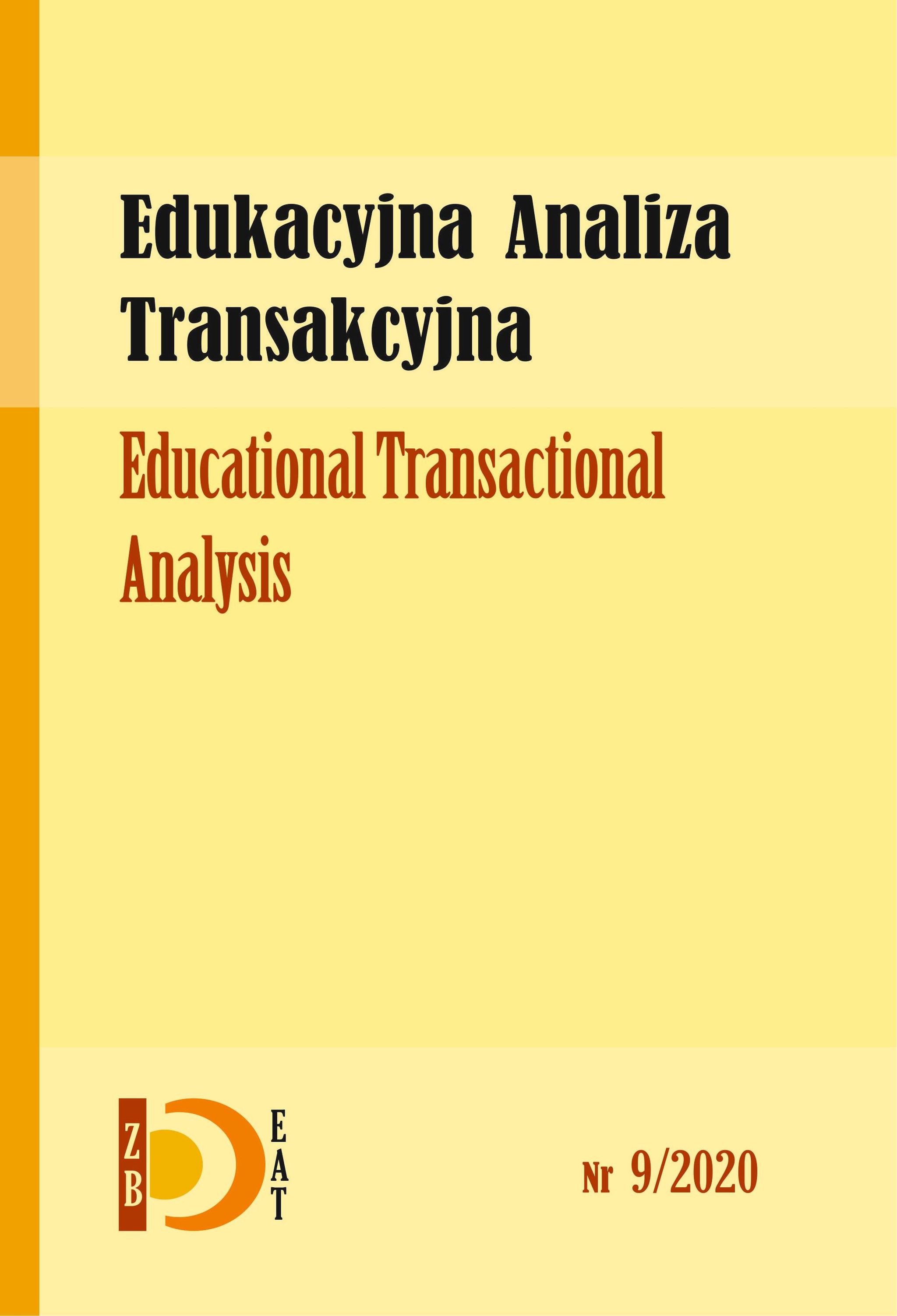Educational passivity – from theory to practice
Implications of the studies of educational passivity for the theory and practice of transactional analysis
DOI:
https://doi.org/10.16926/eat.2020.09.10Keywords:
passivity, educational transactional analysis, applied researchAbstract
The article offers a review of “Passivity at school” by Pierzchała (2013) in terms of the implications for theory and practice of transactional analysis. The main findings from the research project were summarised and compared to other studies concerning passivity. Pierzchała’s contribution to theory lies in providing an evidence base for the concepts of passive behaviours by integrating qualitative and quantitative research methods. The practical implications underline the necessity to confront passivity both in teachers and learners, taking account especially of overadaptation that is reinforced systemically. Relevant short case studies illustrate how theoretical discussions can be translated into educational practice
Downloads
References
Babcock, D. (1975). Teaching Caregivers to Win. Transactional Analysis Jour- nal, 5 (4), 392–395.
Barrow, G. (2009). Teaching, Learning, Schooling, and Script. Transactional Analysis Journal, 39 (4), 298–304.
Berne, E. (1966). Principles of group treatment. New York, NY: Grove Press. Berne, E. (1970). Sex in human loving. New York: Simon & Schuster.
Berne, E. (1971). A layman’s guide to psychiatry and psychoanalysis. Harmond-sworth, England: Penguin Books. (Original work published 1957).
Campos, L. (1975). Institutional Discount Structures. Transactional Analysis Journal, 5 (1), 60–61.
Edwards, S. (1979). Hyperactivity as Passive Behavior. Transactional Analysis Journal, 9 (1), 60–62.
Erskine, R.E. (1982). Transactional analysis and family therapy. In: A. Home & M. Ohlson (eds.), Family counseling and therapy (pp. 245–275). Itasca, IL: F.E. Peacock.
Fine, M. (1975). The personal orientation scale for teachers. Kansas: Lawrence. Fine, M., Covell, G., Tracy D. & B. (1978). The Effects of TA Training on Teacher Attitudes and Behavior. Transactional Analysis Journal, 8 (3), 236–239. Garcia, F. (1982). Reactivity. Transactional Analysis Journal, 12 (2), 123–126. Hart E. Wayne (1976). Symbiotic Invitations. Transactional Analysis Journal, 6 (3), 253–254.
Hoy, W., Blankenship, J. (1972). A comparison of the ideological orientations and personality characteristics of teacher acceptors and rejectors of BSCS biology. Science Education, 56, 71–77.
Jusik, P. (2017). Formal and Informal Use of TA Counselling in Education. Edukacyjna Analiza Transakcyjna, 6, 67–85.
Mellor, K., Schiff, E. (1975). Discounting. Transactional Analysis Journal, 5 (3), 295–302.
Montuschi, F. (1984). Teacher’s Scripts and In-Service Training Programs. Tran- sactional Analysis Journal, 14 (1), 29–31.
Naughton, M., Tudor, K. (2006). Being White. Transactional Analysis Journal, 36 (2), 159–171.
Pickett, L. (1986). The Integrative Classroom. Transactional Analysis Journal, 16 (4), 241–246.
Pierzchała, A. (2013). Pasywność w szkole: Diagnoza zjawiska z punktu widzenia analizy transakcyjnej. Częstochowa: Wyd. Akademii im. J. Długosza w Czę- stochowie.
Schiff, A., Schiff, J. (1971). Passivity. Transactional Analysis Journal, 1 (1), 71– 78.
Schiff, J., Schiff, A. (1975). Frames of Reference. Transactional Analysis Jour- nal, 5 (3), 290–294.
Schlegel, L. (1998). What is Transactional Analysis? Transactional Analysis Jo- urnal, 28 (4), 269–287.
Schmid, B. (1994). Transactional analysis and social roles. In: G. Mohr & T. Ste- inert (eds.), Growth and change for organizations: Transactional analysis new developments 1995–2006 (pp. 32–61). Pleasanton, CA: International Transactional Analysis Association.
Schmid, B. (2008). The Role Concept of Transactional Analysis and other Approaches to Personality, Encounter, and Cocreativity for All Professional Fields. Transactional Analysis Journal, 38 (1), 17–30.
School climate profile. Engelwood, Colorado, CFK, Lt., 1973.
Zerin, E., Zerin, M., Cuiran, Z. (1997). A Comparative Study of Chinese and American High School Students’ Responses to Stress under Pressure. Transactional Analysis Journal, 27 (4), 241–255.
Downloads
Published
How to Cite
Issue
Section
License
Copyright (c) 2020 Piotr Jusik

This work is licensed under a Creative Commons Attribution 4.0 International License.
I am aware that the Educational Transactional Analysis journal is published under a Creative Commons license - Attribution (https://creativecommons.org/licenses/by/4.0/legalcode).
By submitting the article, I agree to make it available under this license

